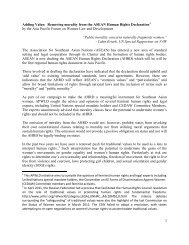A Digest of Case Law on the Human Rights of Women - Asia Pacific ...
A Digest of Case Law on the Human Rights of Women - Asia Pacific ...
A Digest of Case Law on the Human Rights of Women - Asia Pacific ...
You also want an ePaper? Increase the reach of your titles
YUMPU automatically turns print PDFs into web optimized ePapers that Google loves.
Madhu Kishwar and o<strong>the</strong>rs v State <str<strong>on</strong>g>of</str<strong>on</strong>g> Bihar and o<strong>the</strong>rs with Juliana Lakra v State <str<strong>on</strong>g>of</str<strong>on</strong>g> Bihar (India)<br />
Tenancy Act”] governing tribal communities in <strong>the</strong> state <str<strong>on</strong>g>of</str<strong>on</strong>g> Bihar and o<strong>the</strong>r parts<br />
<str<strong>on</strong>g>of</str<strong>on</strong>g> India, provided for successi<strong>on</strong> al<strong>on</strong>g <strong>the</strong> male line to <strong>the</strong> exclusi<strong>on</strong> <str<strong>on</strong>g>of</str<strong>on</strong>g> women.<br />
Traditi<strong>on</strong>ally in tribal communities cultivati<strong>on</strong> was always carried out as a joint<br />
enterprise by <strong>the</strong> family in which women, as wives and daughters <str<strong>on</strong>g>of</str<strong>on</strong>g> <strong>the</strong> male<br />
landholder, worked <strong>on</strong> <strong>the</strong> land al<strong>on</strong>gside <strong>the</strong> men. At <strong>the</strong> death <str<strong>on</strong>g>of</str<strong>on</strong>g> <strong>the</strong> landholder<br />
<strong>the</strong> tenancy was transferred to <strong>the</strong> next male in <strong>the</strong> line. As a result, <strong>the</strong> females<br />
whose interests were joined with <strong>the</strong> last male holder, were rendered landless and<br />
<str<strong>on</strong>g>of</str<strong>on</strong>g>ten suffered loss <str<strong>on</strong>g>of</str<strong>on</strong>g> livelihood and destituti<strong>on</strong>. Although a widow or an unmarried<br />
daughter had usufructary rights (<strong>the</strong> right to use without any title) in <strong>the</strong> family land<br />
for her lifetime, as established by <strong>the</strong> State Level Tribal Advisory Board in 1988,<br />
<strong>the</strong>re was no guarantee that <strong>the</strong> male heirs would respect that right.<br />
The first petiti<strong>on</strong>er was <strong>the</strong> editor <str<strong>on</strong>g>of</str<strong>on</strong>g> an activist women’s magazine, a widow and a<br />
married daughter from <strong>the</strong> Ho tribe. The sec<strong>on</strong>d petiti<strong>on</strong>er was a woman from <strong>the</strong><br />
Ora<strong>on</strong> Christian tribal community. The petiti<strong>on</strong>ers based <strong>the</strong>ir claim <strong>on</strong> two arguments.<br />
First, <strong>the</strong>y claimed that secti<strong>on</strong>s 7, 8 and 76 <str<strong>on</strong>g>of</str<strong>on</strong>g> <strong>the</strong> Tenancy Act discriminated<br />
<strong>on</strong> <strong>the</strong> basis <str<strong>on</strong>g>of</str<strong>on</strong>g> sex because <strong>the</strong>y provided for exclusive male successi<strong>on</strong> and thus<br />
c<strong>on</strong>travened <strong>the</strong> fundamental right to equality between men and women and <strong>the</strong> right<br />
to livelihood for women, which were both guaranteed in <strong>the</strong> C<strong>on</strong>stituti<strong>on</strong>.<br />
Alternatively, <strong>the</strong> petiti<strong>on</strong>ers argued that <strong>the</strong> term “male descendants” in secti<strong>on</strong> 7 <str<strong>on</strong>g>of</str<strong>on</strong>g><br />
<strong>the</strong> Tenancy Act should be interpreted expansively to include “female descendants”<br />
in accordance with <strong>the</strong> rules <str<strong>on</strong>g>of</str<strong>on</strong>g> legislative interpretati<strong>on</strong> set out in secti<strong>on</strong> 13(1) <str<strong>on</strong>g>of</str<strong>on</strong>g><br />
<strong>the</strong> General Clauses Act 1897. This Act states that where legislati<strong>on</strong> refers to <strong>the</strong><br />
masculine gender, it is to include females, unless such an interpretati<strong>on</strong> is repugnant<br />
to <strong>the</strong> c<strong>on</strong>text <str<strong>on</strong>g>of</str<strong>on</strong>g> <strong>the</strong> statute.<br />
The resp<strong>on</strong>dents, <strong>the</strong> State <str<strong>on</strong>g>of</str<strong>on</strong>g> Bihar and o<strong>the</strong>rs, argued that allowing successi<strong>on</strong><br />
rights to female heirs would increase <strong>the</strong> threat <str<strong>on</strong>g>of</str<strong>on</strong>g> land alienati<strong>on</strong> and fragmentati<strong>on</strong>.<br />
They relied up<strong>on</strong> a report, commissi<strong>on</strong>ed by <strong>the</strong> State <str<strong>on</strong>g>of</str<strong>on</strong>g> Bihar, which had found<br />
that <strong>the</strong> tribal people in <strong>the</strong> area were not interested in having <strong>the</strong> law changed or<br />
reinterpreted to change <strong>the</strong> existing situati<strong>on</strong>. The report c<strong>on</strong>cluded that if <strong>the</strong> estates<br />
went into <strong>the</strong> hands <str<strong>on</strong>g>of</str<strong>on</strong>g> female heirs, <strong>the</strong>re would be great agitati<strong>on</strong> and unrest am<strong>on</strong>gst<br />
tribal people who were sensitive to matters relating to <strong>the</strong>ir custom. The resp<strong>on</strong>dents<br />
also argued that <strong>the</strong> usufructary rights <str<strong>on</strong>g>of</str<strong>on</strong>g> female dependants, which were supported<br />
by <strong>the</strong> C<strong>on</strong>stituti<strong>on</strong>, sufficiently protected <strong>the</strong> livelihood <str<strong>on</strong>g>of</str<strong>on</strong>g> female dependants and as<br />
a result, changes to successi<strong>on</strong> rights for females were unnecessary.<br />
The majority decisi<strong>on</strong><br />
The Court recognised that <strong>the</strong> customary law <str<strong>on</strong>g>of</str<strong>on</strong>g> successi<strong>on</strong> discriminated against<br />
tribal women but refused to strike it down. The Court held that it was not desirable<br />
to declare customary law to be c<strong>on</strong>trary to <strong>the</strong> c<strong>on</strong>stituti<strong>on</strong>al rights <str<strong>on</strong>g>of</str<strong>on</strong>g> women under<br />
33



